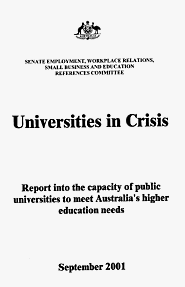
Australia's Public Universities -
Are They Good Enough?
ERA 2012 a Distraction?
"Disciplines Will Record Journals in Which They Were Published Most Frequently"

|
Editorial
- 30 June 2011 |
|
|
|
|
|
|
|
|
Australia's Public Universities - Are They Good Enough?
ERA 2012 a Distraction?
"Disciplines Will Record Journals in Which They Were Published Most Frequently"
|
|
Trinity College Dublin's provost-elect and professor of bioengineering, Patrick Prendergast, on a short visit to look over the "Melbourne Model" commented to The Australian's Julie Hare that Trinity College's ability to deliver world-class education and research during straitened economic times is because of the "huge commitment and dedication of staff", but went on to say: "The situation is unsustainable and the quality of our education and research is vulnerable unless we change our funding model."
He noted that the siren song of increasing international student numbers is alluring, however, the Australian situation is being seen in many quarters as: "a cautionary tale [and] while Trinity College could be on a trajectory to increasing international students -- from an education and financial perspective -- many of the alarm bells point to Australia. At what point does it become unsustainable if it is being used to pay for the education of Australian students and make universities very vulnerable to student demand?"
____________________________________
Not quite 11-years ago the Australian Senate referred an inquiry "into the capacity of public universities to meet Australia's higher education needs" to the then Senate Employment, Workplace Relations, Small Business and Education Committee. There were eight main terms of reference which covered: current funding arrangements, increasing reliance on private funding, public liability consequences of commercial activity, equality of availability, attracting and retaining good staff, effect of universities on economic growth, university regulation, e.g. accreditations and finally the sufficiency or otherwise of obtaining independent advice on higher educational matters.
Seventy-three submissions were received by the committee. Some made very interesting reading. The following rather cynical (realistic?) excerpt is all too understandable:
Nothing will be said to this inquiry that has not been said to previous inquiries. Indeed in the short time available, the Inquiry is certain to receive from the NTEU, the AVCC and all the other interested groups and institutions a set of 'cut and paste jobs' most of which, because of the wonders of modern communications, are already in the public domain. All the likely recommendations have already been presented. All the information of relevance is available. We are told that this is not a political exercise. While we have a tertiary education system dominated by political agendas and overpowering bureaucracies, everything is political.
And back then Senators John Tierney and Kim Carr were antagonists on an SBS Insight forum (March 8, 2001) which was the subject of an Op-Ed piece on TFW entitled Don't panic- it's just a matter of definition. As was said above, "everything is political."
At the time TFW quoted a few of the observations submitted to the committee regarding the capacity of public universities to meet Australia's higher education needs.
 Why
not give those universities which see themselves as serious players on the world
academic scene sufficient institutional autonomy and flexibility to achieve
their goals? Then they may act as beacons to guide and inspire other
institutions of higher education in Australia to emulate some facets of their
achievements; (cf. Group of Eight, 2000).
Why
not give those universities which see themselves as serious players on the world
academic scene sufficient institutional autonomy and flexibility to achieve
their goals? Then they may act as beacons to guide and inspire other
institutions of higher education in Australia to emulate some facets of their
achievements; (cf. Group of Eight, 2000).
The system as a whole will not become world class under present financial
arrangements. The lack of real support for the plethora of reports in recent
years shows that the political will to achieve this is absent.
Why is the issue of falling standards across the system not more widely
acknowledged? Essentially because the first institution to do so is liable to
suffer a drop in applications to enrol, particularly from the brighter students
and fee-paying students, risking a drop in EFTSU-based funding and fee income,
and endangering prestige and job security.
The changes of the last decade to the pattern of funding for universities have
produced a significant incentive to lower standards. There are now enough
examples in the public domain for it to be clear that the incentive has been
accepted by at least some parts of the university system, producing a serious
devaluing of the currency of Australian degree qualifications.
The recent Government "Innovation Statement", while it is to be welcomed for the
stimulus it will eventually provide in science and technology, nevertheless
falls far short of addressing the serious infrastructure problems now facing
universities as a result of the real decrease in basic funding for research and
teaching across the board. The Statement also appears to almost completely
ignore the serious funding crisis in non-science and technology areas.
...increased emphasis on universities as business enterprises and the pressure
to generate external funding and to develop industry partnerships all combine to
threaten the objectivity and integrity that has traditionally been associated
with university-based research.
The Senate committee's 440-page report, Universities in Crisis, was submitted to federal parliament in September 2001.
There is no record of it having significant influence on governmental policy. And looking back over the past decade what progress has been made relative to our cohort of nations, keeping in mind Professor Prendergast's admonition: "...from an education and financial perspective -- many of the alarm bells point to Australia. At what point does it [increasing international student numbers] become unsustainable if it is being used to pay for the education of Australian students and make universities very vulnerable to student demand?"
Alex Reisner
The Funneled Web